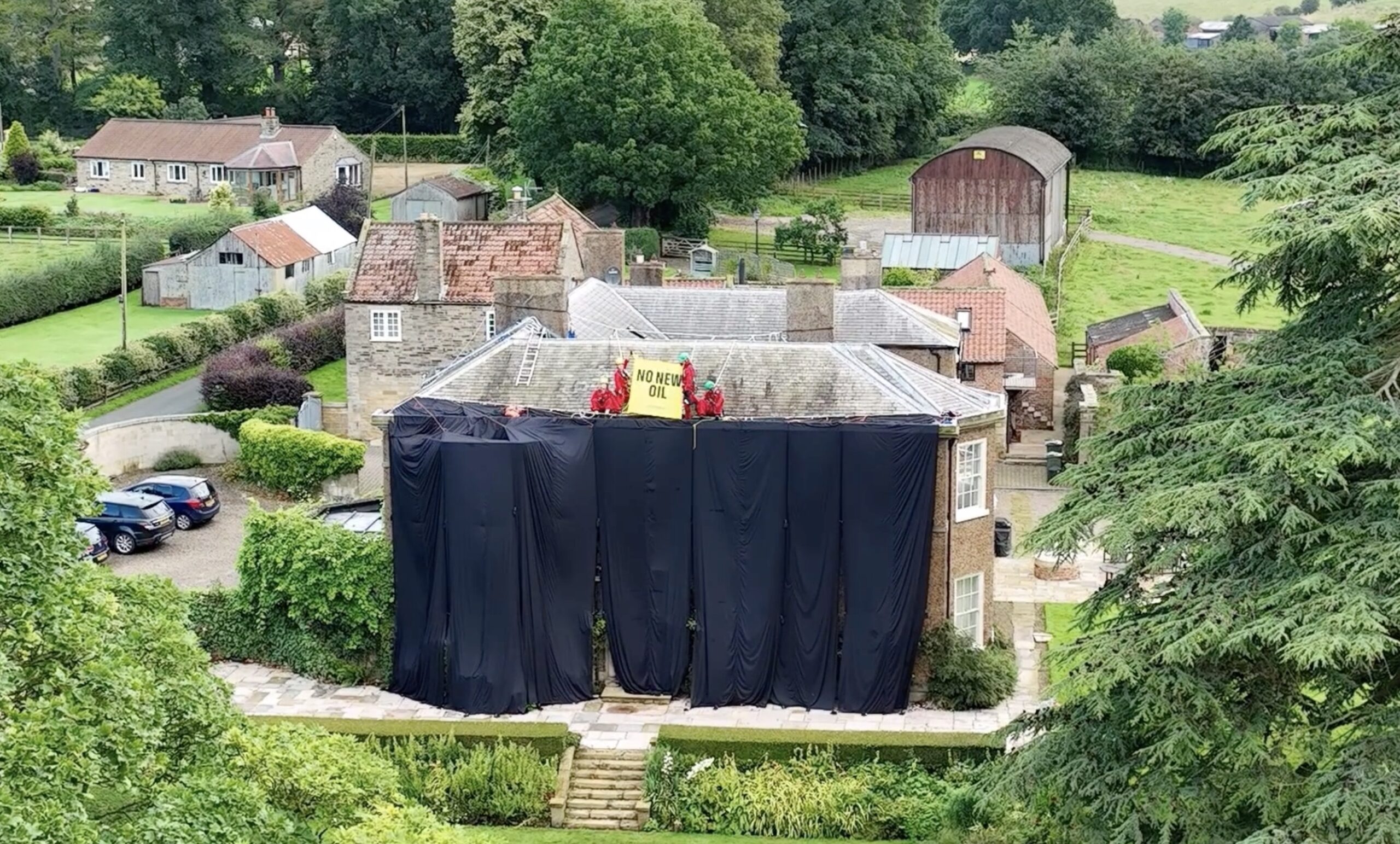
One morning in early August, four Greenpeace climbers covered Rishi Sunak’s North Yorkshire mansion in 200 metres squared of oil-black fabric.
They’re protesting major government plans for more North Sea oil and gas drilling, during a summer of escalating climate impacts.
Sunak’s government has come under heavy criticism for pushing ahead with plans to hand out around 100 new oil and gas licences in the North Sea.
Read more on this story: Rishi Sunak: whose side are you on?
The government is also deciding whether to approve oil drilling at Rosebank – the largest undeveloped oil field in the North Sea. And Rishi Sunak has said he thinks it should go ahead.
Facts about the protest
Nobody was home
Sunak and his family are on holiday in California. The protest was deliberately timed for when they were away.
The house wasn't damaged
We carry out our actions with care, and Greenpeace activists are rigorously trained to avoid causing damage.
New North Sea oil won’t lower bills or help with the UK’s energy security
Drilling for new oil in the North Sea will do nothing to increase our energy security, or lower people’s bills. Only a commitment to renewables and energy efficiency can.
When oil is drilled from the North Sea, 80% is exported. The UK will have to buy it back at the international market price.
This is because the oil in Rosebank and other parts of the North Sea doesn’t belong to the British government, or the public.
It belongs to the companies that get the licence to drill. And they will sell it to the highest bidder (which is usually another country).
Rosebank, for example, will only benefit a handful of fossil fuel shareholders. Last year, Equinor made $28.7 billion in profits.
UK taxpayers pay huge subsidies to help oil companies make massive profits
That’s not the worst of it. Even though the UK public won’t benefit, taxpayers will still pay for 91% of development costs, through government subsidies.
Rosebank lies 80 miles off the Shetland coast in the North Atlantic. Norwegian oil giant Equinor has submitted an application to develop the field, with the help of UK government subsidies.
If Rosebank goes ahead, Equinor will be handed in effect £3.75 billion of UK public money to develop the field – as many of us struggle to make ends meet.
But drilling at Rosebank and other fields in the North Sea will be catastrophic for the climate and a terrible deal for the British public. The profits will go to the oil industry.
Dishing out hundreds of licences for new North Sea oil drilling will be catastrophic for the climate
Burning all of just Rosebank’s oil and gas would be a disaster for the climate. It would create more CO2 pollution than the combined annual emissions of all 28 lowest-income countries in the world, according to World Bank data.
The International Energy Agency is clear there must be no investment in new oil and gas fields (not already in development in 2021) if the world is to meet the goals of the Paris agreement.
The IPCC has also said that existing fossil fuel projects are enough to take us over the internationally-agreed threshold of 1.5C.
Adding new oil supplies from the North Sea will push us closer to parts of our world becoming uninhabitable.
What Rishi Sunak’s government needs to do instead
The government must commit to ending all new oil and gas projects.
According to new research from the Energy and Climate Intelligence Unit, a “no new oil and gas fields” policy in the North Sea would remove the equivalent amount of energy generated by just one offshore wind farm.
Last winter’s rocketing energy prices should have been a wake-up call.
The only way to ensure a secure affordable supply of energy for the UK is to build more renewable energy, which we are lucky to have in abundance.
There are 649 UK onshore wind and solar projects which already have planning permission. If they all went ahead, they’d save more gas than we used to import from Russia.
This is the only way to lower bills, create jobs for the long term and look after our planet.
Read our Executive Directors’ letter to Prime Minister Rishi Sunak after the protest, published in the Guardian.
